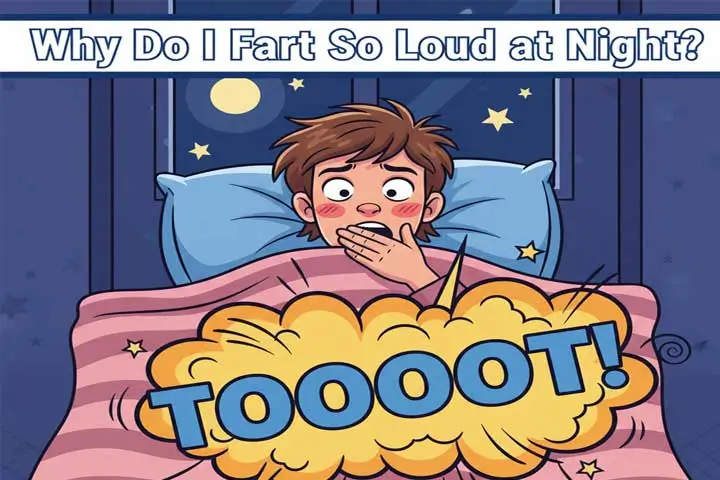Let’s face it—we all pass gas. But for some reason, those nighttime farts seem louder, funnier, and sometimes even a little embarrassing. You might find yourself wondering, “Why do I fart so loud at night?” Don’t worry—you’re not alone, and you’re not broken!
In this article, we’ll dive into the quirky science of flatulence, why your farts might echo like a tuba in the still of the night, and what you can do if it bothers you. From diet to digestion, lifestyle habits to medical conditions, we’ll cover all the bases—while keeping things informative, light-hearted, and easy to digest.
The Science of Flatulence
Before we can understand loud nighttime gas, let’s start with the basics.
- What is a fart? Flatulence is the release of intestinal gas through the rectum. This gas forms as your digestive system breaks down food and as gut bacteria ferment certain fibers.
- What’s in a fart? Gas is usually a mix of nitrogen, carbon dioxide, hydrogen, methane, and small amounts of sulfur compounds (which cause the smell).
- Why do farts make noise? The sound comes from vibrations of the anal sphincter as gas escapes. The tighter or looser the muscles, the higher or lower the pitch.
So, the simple answer: a fart is just gas escaping, and the sound is all about muscle vibrations.
Why Farts Sound Louder at Night
Now let’s tackle the big question: why does nighttime make everything noisier?
1. Relaxed Muscles During Sleep
At night, your body naturally relaxes, including the anal sphincter. This means gas can escape more easily and with less resistance—sometimes producing bigger, louder bursts.
2. Sleep Position Matters
When you’re lying down, especially on your back, gas can pool in the intestines differently than when you’re upright. This can cause sudden, forceful releases that are louder than daytime farts.
3. Quiet Amplifies Everything
During the day, background noise (conversations, traffic, TV) masks bodily sounds. At night, the quiet makes every toot seem like a stadium announcement.
Diet-Related Factors
Your diet plays a huge role in how much gas you produce—and how noisy it is.
- Gas-producing foods: Beans, lentils, broccoli, cauliflower, cabbage, onions, and dairy are infamous gas-makers.
- Carbonated drinks: Soda and sparkling water introduce extra air into your digestive tract.
- High-fiber dinners: Eating lots of fiber late in the evening gives gut bacteria more material to ferment while you’re asleep.
- Late-night snacks: If you eat close to bedtime, digestion continues while you sleep, increasing the chance of nighttime flatulence.
Lifestyle & Habits
Sometimes it’s not just what you eat, but how you eat and live.
- Eating too quickly: Swallowing air adds more gas to your system.
- Lack of movement: If you eat dinner and then crash on the couch, digestion slows down. Movement helps gas travel smoothly.
- Dehydration: Without enough water, digestion becomes sluggish, leading to gas buildup.
Medical Causes of Excessive or Loud Gas
If your nighttime farts seem extreme, certain medical conditions could be at play.
- Lactose intolerance: Trouble digesting dairy sugar (lactose) can cause gas, bloating, and loud farts.
- Irritable Bowel Syndrome (IBS): IBS often comes with excessive gas, abdominal discomfort, and irregular bowel movements.
- Food intolerances: Gluten, fructose, or artificial sweeteners can cause digestive upset.
- Gut bacteria imbalances: When the gut microbiome is off, gas production can increase.
Is Loud Nighttime Farting Harmful?
Here’s the good news: loud farts are usually harmless. Flatulence is a natural sign that your digestive system and gut bacteria are doing their job.
But if you experience:
- Persistent bloating
- Abdominal pain
- Blood in stool
- Unexplained weight loss
…then it’s wise to consult a doctor, as these can signal underlying conditions.
Practical Tips to Reduce Loud Farts at Night
If your nighttime gas is disruptive (to you or your bed partner!), here are some strategies:
- Adjust your diet in the evening: Avoid beans, cruciferous veggies, and carbonated drinks at dinner.
- Eat earlier dinners: Give your body more time to digest before bed.
- Stay lightly active: Take a short walk after dinner to help move gas along.
- Try probiotics: These can balance gut bacteria and reduce excessive gas.
- Relax before bed: Stress can affect digestion, so try deep breathing or light stretching.
When to See a Doctor
Most of the time, loud nighttime farting is normal. But schedule a medical check if you notice:
- Severe or ongoing pain
- Gas accompanied by chronic diarrhea or constipation
- Sudden digestive changes
- Blood, mucus, or unexplained weight loss
A professional can rule out IBS, lactose intolerance, or more serious gastrointestinal issues.
FAQs About Nighttime Farting
1. Why are farts louder at night than during the day?
Because your muscles are relaxed, you’re lying down, and the quiet makes every sound seem louder.
2. Does sleep position affect fart sounds?
Yes! Lying on your back or stomach can change how gas is released compared to sitting upright.
3. What foods make night farts worse?
Beans, broccoli, cabbage, dairy, and fizzy drinks are common culprits.
4. Can probiotics reduce nighttime farting?
They can help balance gut bacteria and reduce excessive gas, though results vary.
5. Is it unhealthy to hold in farts while sleeping?
Holding in gas can cause bloating and discomfort. It’s better (and healthier) to let it out.
Conclusion
So, why do I fart so loud at night? The answer lies in a mix of relaxed muscles, body positioning, diet, and good old-fashioned acoustics. In most cases, it’s completely natural and harmless—just your body doing its thing.
If your nighttime gas is disruptive, a few dietary tweaks, lifestyle adjustments, and probiotics can make a big difference. And if symptoms are severe or unusual, don’t hesitate to consult a healthcare professional.
At the end of the day, farting—loud or soft, day or night—is proof that your digestive system is alive and kicking. So laugh it off, take care of your gut, and sleep easy.
Refarence: https://www.medicalnewstoday.com/articles/gas-at-night

